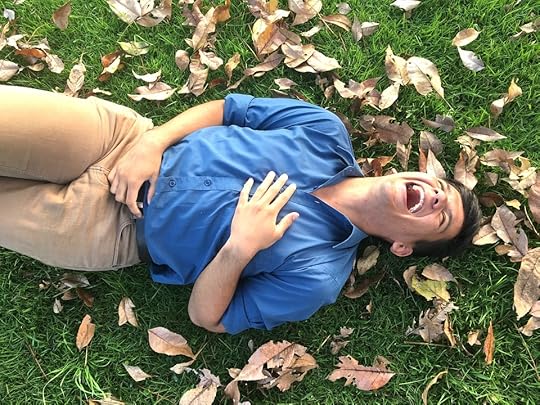Alan Watt's Blog, page 9
October 11, 2017
Opportunities in Self-Publishing

The goal of every first-time novelist is to see her book between covers. The paradox is that when we make this goal more important than the story, we tend to find ourselves stuck.
The good news for first-time novelists is that the barriers to publication have blown wide open. Self-publishing used to have a terrible stigma attached to it. It was the domain of desperate wannabes who were willing to be bilked out of ten grand in order to quell their vanity and have something to show their friends. Those people still exist, and are never going away. But with the traditional publishing world crumbling fast, new models for publishing are springing up, and legitimate platforms are presenting themselves to support first-time novelists like never before.
So, return your focus to the task at hand. Write your book. While you’re writing, new opportunities are being designed to present your first novel to the world.
Please share your thoughts on this.
October 9, 2017
Humor Is Not About Writing Funny

Humor connects us. It makes us care. I don’t mean one-liners. Humor is not about jokes, it is about human behavior. It’s a vital aspect of any story, adding depth, richness and humanity. Drama without humor is unbearable, and comedy without drama falls flat. Shakespeare understood that in order for the audience to experience the impact of loss and betrayal, they needed breathing room. Without it his tragedies would be unbearable to watch. Humor provides contrast, allowing our reader to contextualize the events.
Humor is not about writing funny, but it is about writing “specifically.” It’s about finding the humanity in the situation. In the midst of two characters attempting to get what they want, there is humor. There is humor in the absurdity of our misplaced priorities. There is humor in our desire to be good, to do it right, in our fear of being left out, our embarrassing need for connection, our awkward wish to be acknowledged, our petty desires for retribution. There is humor in our rage at not getting the parking space, and our permitting great sins to be done to us for fear of appearing uncivilized. There is humor in our fragility.
Humor keeps drama in check. When a writer is accused of melodrama, it is not that the characters are overreacting, the writer is. When drama becomes an excuse for therapy, it loses its universal quality, its ability to shine a light on the truth. Humor is the balm on our drama. It is through levity that we break our readers’ hearts. Even in the grimmest situations, with ruthless objectivity a writer can wring humanity from the moment. As seriously as we take our work, finding humor in it can only offer a fuller glimpse of the world.
Please share your thoughts on this.
October 6, 2017
How to Master Storytelling: Ask the Right Questions

“It is a parable of art that, to be universal, you must be specific. Otherwise, you are just talking about an abstraction. So you have to talk about a particular person and a particular place. Specificity is the essence of art. But it doesn’t mean it doesn’t have universal resonance.”
– David Cronenberg
Writing is really about asking the right questions. What is commonly referred to as technique is the trained ability to create a space for our imagination to play. Our brain is excellent at one task. It answers the questions we ask it. We might wonder “What is wrong with me that I can’t figure out my story?” and our brains give us an answer. It tells us that we are undereducated, or overeducated, or maybe that our happy upbringing has not prepared us for the artist’s angst-ridden existence. And then, our brain takes over and we approach our story as an intellectual exercise, cutting ourselves off from the wellspring of our imagination. We become lost in a way of thinking that is counter-productive. For some people this can go on for years. It becomes their reality as they start to wonder if they are cut out to be artists, despite their longing. This is a frustrating predicament.
To master storytelling, we must ask the right questions.
We may begin with the most general questions as we imagine the world of our story. We may not even realize we are asking questions as we wonder where our hero lives and what she does for a living and if she is in a relationship, and if so, for how long, and is she really in love, and what is she struggling with, and how does she respond when her boyfriend confesses that he is a werewolf? We do this quite naturally. It is fun as we continue to imagine, while holding it all loosely. The stakes are low because we are just testing the waters to discover if our idea is seaworthy. And then we start to ask more specific questions, like “What does my hero want? What does she need? What is the dilemma at the heart of my story? What is the dramatic question? What is the inciting incident?” Etc. And as we do this, the stakes get higher. We become invested, and the challenge becomes to remain in our rightful place of “not knowing,” of staying curious. The temptation is to want to take the reins and control the process, but this is a mistake.
Story is not linear. We cannot figure it out. We aren’t supposed to. We are channels. The desire to write is connected to the desire to evolve. Our novel or screenplay is really just a manuscript documenting our own journey to transformation. This is a humbling position, but necessary, otherwise we panic every time we don’t have an answer for where our story is heading. Writers often talk about how “the story wrote itself.” What they are talking about is surrendering to the process and taking their rightful place as a channel.
Does this mean we don’t get frustrated? Of course not. Being “in the zone” is not something we can call up on demand. It seems that this process demands that we not see ourselves as objects. We can’t treat ourselves as story robots. We have to cut ourselves some slack.
As we approach the midpoint in our screenplay or novel, we may want to ask ourselves what events transpire that lead our hero to temptation. Be curious about how this moment might connect to her primal want. And if we don’t see a connection, it is not because this moment is wrong, but it is an invitation to inquire and get more specific about the connection.
Example: At the midpoint of Rocky, Stallone is offered to fight the champ. He is tempted to say no, to keep things the way they are. He is dating Adrian. Things are good. He doesn’t want to have to confront this lingering question that he could have made something more of himself. But he can’t shake it. His decision at this moment has been set up earlier. What makes our hero heroic is that he never gives up on his want (even at the end of Act 2 when he surrenders – he surrenders his desire, but he never gives up his want. He merely reframes it. “I can’t win. But if I can go the distance, then I’ll know I’m not another bum from the neighborhood.”)
There is no one correct way to write. Some of us tend to write more character-driven pieces while others are more plot-driven. In the end we are all seeking to accomplish the same thing: to satisfy a dramatic question in a specific and compelling way.
The plot points are all connected to our hero’s driving want. Through asking the structure questions and remaining curious, we are led to a more specific understanding of our story.
Share with me your thoughts on this.
October 4, 2017
First Time Novelists: The End of the Story Informs the Beginning

In Steven Covey’s book, The 7 Habits of Highly Effective People, he states: “Begin with the end in mind.”
For first-time novelists, this is helpful advice. But let’s clarify. When we talk about “the end,” rather than thinking about the plot, let’s consider our characters and in particular our protagonist. How is she relating differently to other characters? What has she come to understand as a result of this journey?
Character suggests plot, and for writers, I believe this is crucial.
It’s easy to get stuck in our idea of how the story should go. When we drop our idea, we become open to surprises. It’s not that our idea was incorrect, it’s just that it was incomplete.
First-time novelists tend to want to figure it all out. By having a sense of your ending, your subconscious is free to fill in the blanks and write to that place.
The story may change. It may go in all sorts of directions that we hadn’t considered. Part of the thrill of being a first-time novelist is that we have not yet imposed any rules on ourselves.
Share with me your thoughts on this.
September 27, 2017
Myths that Prevent Us from Writing

There are myths that prevent first-time novelists from not only completing their novels, but from even getting started. Some of these myths are concocted by the world out there, and some of them are vague terrors that dwell within. Here are a few:
1) I can’t be a novelist without an MFA in fiction.
Yes, you can. The story lives in our imaginations, not in our brains. You become a writer by writing.
2) I can’t be a writer until I complete my research.
Yes, you can. What we care most about is the story, the relationships. In the rewrite, you can do the necessary research to add the stink of realism.
3) I can’t write my memoir until my parents die.
Every writer fears the fallout of telling the truth on the page, regardless of whether it is fiction or non-fiction. Your parents already know you’re not a virgin. They already know you went through a phase where you hated them. It’s incredible how differently our loved ones see themselves than how we see them. Trust me. Write whatever you want. They won’t even notice.
Tell your story. Let go of the result. Become a writer today.
Please share your thoughts on this.
September 25, 2017
Twelve Principles of The 90-Day Novel

In creating a story, there are no rules. But there are some basic principles that may help guide the writer to completion of a first draft.
When we stay out of the result, we move in the direction of our story.
Story involves a transformation. There can be no transformation without a surrender.
Our “idea” of our story is never the whole story. It’s not that our idea is incorrect, but that it is incomplete.
When we hold our idea loosely, new opportunities reveal themselves.
By trying to “get it right” we tend to get stuck.
By surprising ourselves, we are led to a coherent narrative.
When we try to “figure it out,” we tend to kill the aliveness of our characters.
When we explore the “nature” of a moment or scene in our story, we connect to what makes it universally relatable.
By exploring the opposite direction of where we believe our story ought to move, we are led to a more dynamic and clearer version of our story.
When we see our characters as functions of a dramatic question rather than “real people” they tend to become more like real people.
Story is infinitely malleable. As long as we stay connected to our source, that ineffable impulse that got us started, the order of events may alter, characters might be conflated, scenes added or deleted, but the essential story will not be lost.
Through the process of story creation we cannot make a mistake. Everything we write either belongs or is leading is to what belongs in our story.
Please share with me your thoughts on this.
Buy the book
Take the Workshop
September 20, 2017
The Internet: A Writer’s Worst Distraction

Sometimes the deeper we get into our story, the more we seek distraction. The internet will suck the life out of any writer. It will turn the most disciplined among us into bug-eyed addicts. Not only can it swallow great chunks of our precious writing time, it can assault the senses and steer us away from the stillness of our source.
I urge any writer to avoid the web until writing is done for the day. The same goes for cell phones, any phone calls for that matter, texting, grocery shopping, business, emails, taxes, dinner plans, visits with the in-laws. Writing requires more quiet and focus than any of these other tasks. Until I get my writing done, I’m a testy bastard. When it’s done for the day, I turn into a pussycat.
What is your worst distraction? How do you avoid it?
Please share with me your thoughts on this.
September 18, 2017
The Dramatic Question, or Theme of the Story

Shakespearean plays begin with the chorus telling us what we are about to see. They don’t tell us the whole plot but rather provide a context for the events that are about to follow.
That is the purpose of the theme. It provides the audience with a context through which to understand the plot.
Our novel or screenplay is about something. If it’s just a series of events that lead to some vague shift for the hero, the audience will scratch their heads and wonder “What the hell was the point of that?”
The dramatic question or theme keeps our story on track. It is the personal made universal, meaning it is something personal to the hero while at the same time being something we can all relate to. “The truth will set you free,” is a theme. “Crime doesn’t pay,” is another theme.
At the beginning of Goodfellas, we watch a teenage Henry Hill learning the ropes from the mob. When his father discovers that he is skipping school and has fallen in with a bad crowd, he beats him mercilessly. The message is clear. Stay away from crime and go to school. It is a nowhere life. This is followed by the mob beating the mailman so that he will no longer deliver Henry’s truant notices, and Henry can skip school without consequence. The theme is being set up. If we are going to show how crime doesn’t pay, we must show the opposing argument. For Henry, crime initially provides him with a sense of power, belonging, and excitement. Through the story the plot is going to lead us to the consequence of this lifestyle.
Themes are time-honored, universal truths. They are the reason we return to stories again and again. Theme is programmed into our DNA. It contains the universal laws that govern evolution. We can discover them for ourselves by tapping into the primal drive of our hero and being curious about how these desires get “played out.”
Share with me your thoughts on this.
September 13, 2017
Plot vs. Theme

Any writer can experience that moment where you suddenly realize that your “idea” of the story isn’t going to get you to the end.
This moment is initially devastating and then, hopefully, liberating as the writer begins to realize that it isn’t her job to know how to get to the end. Her job is to inquire into the nature of what she’s attempting to express, and let her muse come up with the goods.
It’s not just first-time novelists who struggle with plot. Every novelist struggles with shedding the idea of the novel for the truth of the novel.
The solution is to recognize that your plot is simply a vehicle for what you’re attempting to express. Focus on the theme. Stay connected to that, while holding your idea of the novel loosely.
Please let me know your thoughts.
The 90-Day Novel © Telecourse
Next class begins Mon. Sept. 18, 2017
September 11, 2017
Discovering Your Writing Process

As we write each day we discover our own process. We begin to see there is no “right way” to create and that our objective is simply to let the story live. The first draft is a near constant state of discovery. Some revelations may seem counter to the direction we thought our story was heading. You may even discover that how you actually feel about certain things is not what you had previously thought. You may discover you’re not always nice, that you’re opinionated, that you have a dark side, or that you’re bothered by things you think shouldn’t. You may discover that your tolerance for bullshit has gone way down. You may discover that your perception of the world is widening while your certainty on any particular topic is starting to relax.
Perhaps you are noticing little techniques that help your process. Perhaps you prefer writing in the morning, or you like to write on buses that circle the city at 3:00 a.m. You may discover that after a couple of hours you are done for the day. Some writers write for six hours a day, while others put in one hour. There are no rules. Your process is your own and each method is valid. You may have discovered that you don’t need to spend as much time outlining, that after a short while we get antsy and just want to dive in, or, you may feel greater confidence with a rigorous outline to layout your story.
Everyone’s process is different. As long as we continue writing and make it a habit, it doesn’t matter how it gets done. The most important thing is that we stay with the process and remain curious. Our work, these stories we tell, are simply a paper trail documenting our journey back to our truest selves.
Please let me know your thoughts.
The 90-Day Novel © Telecourse
Next class begins Mon. Sept. 18, 2017







